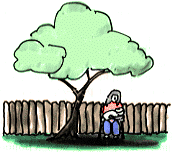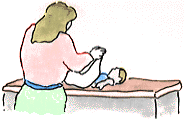
Seeing With New EyesWe would like to mention again our understanding that this period of time — the early months and years of your baby's life — gives all of us who go through it a chance to let our children help us see again how vast and varied and wondrous life really is.
Our world is so speedy right now that we are all pushed to recruit, command, or force our children into a way of life that's pretty questionable — one that seems to be consuming the very world we live in. But it doesn't have to go that way. We can renew the world our children will inherit, and it starts with taking the time — making the time, whatever it takes — to be with and enjoy them. Every time you enjoy a baby's smile or see the spark in a partner's eyes as you both share that enjoyment, you're demonstrating that a satisfying life doesn't have to depend on "things" that are threatening to leave our children a legacy of a garbage-filled world.
Working It Through (Part Three)Now that you both have made the big shift into a life of service to a being so dependent on you, it's not surprising if you and your partner go through some new or further questioning of what your life together is all about. It's also understandable, as your baby wakens you or your partner (or both) for the third or fourth time in a night, that the result is irritation with each other (then or later on) from accumulated fatigue. Another irritant may be differences in attitude toward sexuality that you both may have for awhile. It's pretty common for a new father, with the attention of his partner being so absorbed in the baby, to want sexual contact for reassurance at exactly the time when his partner (who has also gone through some of life's greatest changes) just isn't ready.
All of these things fall into the "personal testing" category — not the kind that involves evaluating your "inner worth" (which is great and beyond testing) but the kind that challenges you and makes you a stronger more capable person. Most of us go for such a long time without this kind of challenge, particularly in the period between the end of teenage changes and the arrival of a child, that the feelings it evokes are greatly magnified at first. But as we begin to see it for what it is, as something as strengthening as the way in which a baby learns to lift his or her head by keeping at it, our life can take on an added dimension.
Being asked to go further than you want to, and to reach for stamina and patience that you may not think you have, certainly isn't easy. So don't think you have to handle it all smoothly and peacefully. You're not "blowing it" if you express your irritation, or if your life with your partner gets so rocky for awhile that you wonder how you're standing each other at all. There's no need to be a saint; you just need to live through it all somehow, with a willingness to forgive yourself and your partner and let go of irritations as quickly as you can. It may help to know that often the darkest moment is just before the dawn. Only a couple of hours after going through a major crisis and feeling that you can't imagine how you ever felt a baby was a blessing, you can feel anything from acceptably normal again to really blissful.
If you have patience and love for yourself, if you give yourself a chance, any stresses that might show up at this time or later on can expand you and your relationship with your partner. And the sense of a truly shared life can add so much to everything, including sexuality, that you may have a hard time remembering what you used to think life was really all about.

"Be flexible!! As an avid planner prior to our son's birth, I found it necessary to be more flexible and spontaneous. One never knows if the next day the baby will be fussy or in a great mood — yes, babies do seem to have moods and we as parents must work with their moods since they're unable to communicate them yet."

"The time is so short and your baby will outgrow the newborn stage by three months or so. Relax...who really cares about a little dust everywhere, and there is always a fast-food place down the street for easy mealtimes."

"Relax and enjoy the new life you have brought into the world. It is a wonderful and hectic time that goes all too quick. Trust your instincts."

"Don't feel guilty if you're not being the parent you thought you'd be. It can be impossible to hold and smile at the baby sometimes, especially at 3 in the morning... Accept the fact that you're human, you get tired and cranky too. Just love the baby and he/she will love you back."

"Take time to process all your new feelings, to think about all the changes you must make in your lifestyle. Experience the wonder of that new little person and the way he/she is struggling to adjust to his/her new world. It is a miracle — a demanding one to appreciate. It requires growth and new attitudes and patience and ever increasing love."

Your Comforting PresenceWhen your baby is crying or obviously about to, it may be helpful to remember that while the triggering need may be for food, a diaper change, a burp, or a removal of some other discomfort, the general all-purpose need is you. Not only is your baby used to, and in need of, the particular imprint you put on life (he or she was inside your body for a long time and knows you very well), but the knowledge of the baby's need for you will help you be calmer as you determine just what, if anything, is "the matter." This calmness, based on a sense of the comfort you bring, in and of yourself, is one of the great gifts for you and your baby.
As your baby gets older, it may also help to understand that you don't have to go to great lengths to stimulate her or him. In fact, you don't even have to talk a lot. Just giving your real undistracted attention to the baby, and "talking" with your eyes and touch can be deeply communicative and satisfying.
It's worth making clear that a father's calm presence is just as comforting. A father's presence is very much a part of a baby's life in the womb, and the earlier a father realizes this during a newborn's life out in the world, the richer things will be for everyone.
The Outdoors As A Pacifier
"Get out of the house" is an old-fashioned piece of advice that has a lot going for it. As strongly as we feel, and think you will, about the joy of quietly sharing life together with your baby, there are definitely times when life together indoors is just too confining. There may be no overt "need" — like shopping or meeting an appointment — to go out, but the inner need to change the scene is reason enough.
In our own life, we have found time after time that a baby who is really upset for a reason that isn't apparent (or isn't something we can immediately resolve) will cheer up as soon as we open the door and take her or him outside. We don't have to go on any expedition, or get the baby dressed for society. Just put something warm around the baby and step outside.

"Share the parenting responsibility! Both mother and father need to diaper, burp, and dress the baby. Both parents need to love, play with and console the baby. There are ways to share the responsibility of feeding the baby even if mother is breastfeeding. A new baby can be consuming and few of us can handle the stress alone. A new baby is delightful and that is a pleasure none of us wants to experience alone."

"Concentrate on the new little person in your life and your spouse. Try to forget about other worries (housework, etc.). They are tiny babies for only a short time and need lots of love and hugs. They are special people."

Love Won't Spoil A BabyIf, like most people, you have heard at various times in your life that you shouldn't "spoil" a baby with too much attention, or that a baby often just has to be left to "cry it out," it's important to understand that what more and more women's intuitions are telling them is true: babies at the outset of life can profitably use all the attention and closeness we can give them, and a response to their demands that is as immediate as possible is a key to a happy, healthy start in life.
As our hearts know, loving connection in the moment is an absolute necessity for a baby's real development. And the latest studies prove once and for all that calculated inattention — leaving a baby to cry it out — is tremendously damaging. Not only does it diminish the baby's confidence in his or her own ability to fit into and act on the world, but it does measurable physiological damage. These recent studies have identified an "arrested action syndrome" — in which failure to be able to act or receive relief in a situation as needed causes the manufacture and absorption of two chemicals, noradrenaline and cortisol, that damage the body's immune system. And this is one major cause of health problems later in life.
It's obviously impossible for anyone to consistently respond to a baby's cries in the first few seconds. It's also not helpful to respond in a worried rush that communicates nervousness to the baby. And there are definitely bound to be times when circumstances force you to leave a baby crying for a good long time. But there's just no doubt that consistent or purposeful ignoring of a baby's needs, even if only to be held, makes for tremendous deprivation and real harm.
There will come a time, perhaps in a month or two, when your intuition will tell you that the period of total attention to the baby above all else can begin to shift a little. There will still be, for many months, the need to give up some other activity in the moment to respond to your baby's needs. But if you're close enough to the baby while doing something that your presence itself is reassuring, and your energy is loving rather than angry at the baby's demands, the baby can wait while you finish cooking — or even eating — something. All that's needed is a loving approach as soon as practical with a relaxed attitude that will convey that the baby's call for your attention has gotten results.
As for now, while your baby is still very small, don't be afraid to respond and show all the love you feel. As many cultures have known for many thousands of years, your baby will thrive on it.
First Connection"For me, one of the high points of my life came when my baby really looked at me for the first time.
"This happened sometime in her second month when she was relaxing in my arms and I was singing to her. I knew she'd kind of looked at me many times before, along with everything else around. But this was something else — real eye contact, then recognition, and then a beaming smile. And obvious delight in seeing me there.
"What a moment!"
Touch
As a kind of P.S. to some things we have already said this month, we'd like to say that your baby's — and your — well-being will benefit from as much touching as you can get into your day together. All the studies of infant-parent "bonding" in the early hours of a baby's entry into the world agree that touch is not only a psychological comfort to all concerned but that it activates physiological processes that are vital to a baby's fullest development. And our own intuitions tell us that touch stays important all through childhood and beyond. So there's no need to hold back or to worry that you're not doing it "right". Just enjoy this beautiful and enabling exchange, this further proof of how deep and powerful wordless communication can be.
Changing Diapers
One pleasant surprise of parent- hood, particularly as your baby gets more responsive, is that diaper changing can become an enjoyable time for you and your baby — a peaceful interlude in which your sense of taking care of your baby and her or his sense of being cared for will combine to produce an especially good feeling between you. You may need to make a point of slowing down sometimes for this to happen, but, if you haven't been already, we think you'll be surprised at how easy and pleasant this supposedly distasteful part of parenthood can be — particularly during the time when your baby is breastfeeding and not eating solids.
All you need for cleaning a baby after taking off a wet diaper is a soft cloth (such as a clean cloth diaper) and some warm water or a little olive oil. To clean the baby after a bowel movement, you only need to use a little soap, well rinsed off, being sure to get in all the folds of the baby's skin. You don't need the fancy preparations at the drug store, or the special "wipes" — some of which actually irritate the baby's skin.
Besides diapers, the basic need for good diapering is to change diapers often enough to keep ammonia and bacteria from building up and irritating your baby. (Twelve to fourteen changes a day seems the norm for newborns.) If you have been using disposables, remember that their absorbency is not a substitute for a diaper change. The disposable may not feel wet to you, but the urine is right there next to the baby's skin, and the plastic outer film of the diaper seals in moisture and creates ideal conditions for bacterial growth. Again, we feel that cotton diapers are the most comfortable, environmentally positive, and considerate of your baby's skin.
And Dealing With Diaper RashMost cases of diaper rash are caused by the ammonia buildup next to the skin when diapers aren't changed often enough. (One reason we feel so strongly that cotton diapers are best for your baby is that their "breathability" not only helps ammonia evaporate off the skin but lets the smell of what's been going on emerge to tell you it's time to change the diaper.) If your baby consistently has a rash with disposables, it definitely would seem worthwhile to change over to cotton diapers for awhile to see what happens.
If you're reasonably sure that ammonia buildup, or some kind of chemical irritation from a disposable or a "wipe" isn't the cause, there are two major possibilities. One is that something in your diet is being passed on through your breastmilk and causing the acid balance of your baby's urine to change. (Besides heavy in- take of things like coffee or of citrus and some other juices, a surprising offender is non-fat milk — which has an abnormal protein concentration that may cause real trouble.)
The other, particularly if your baby's rash is an especially bright red, is that some kind of fungus is the cause. By far the most common source of fungal rash seems to be cornstarch baby powder, but there may be something else in your household environment that's the cause. One of the best ways we know of to help heal an angry rash is to leave the baby's bottom uncovered as much as you can for awhile, to let air and light speed the healing process. The best preparations we know of, which we suggest putting on only just before putting a diaper on your baby again, are zinc oxide ointment or hydrous lanolin. Either of these is available in most drug stores, and is both less expensive and more effective than the usual advertised skin remedies.
Sometimes your baby's evident lack of discomfort will tell you that a rash that looks serious really isn't so. But a severe rash can be pretty painful and lead to real infection.
More About Water. . .
If you haven't noticed by now, breastfeeding can make you thirsty. Don't hesitate to give in to that thirst. You need a lot of liquids to maintain your milk flow and keep your body internally cleansed. It's convenient to keep a water container and glass near your usual nursing spot. Good water is the thing.
. . . And FoodIf you are breastfeeding, your diet is playing a big part in your baby's nutrition. As in pregnancy, focus on eating well, with plenty of good fresh foods, especially greens. Your body and the higher the quality of those calories (from whole foods rather than refined flours and sugars or heavily processed products), the better for both of you.
It's worth remembering, especially if your baby gets fussy at times, that some things you eat — like spicy or highly acid foods — may affect your milk and actually irritate your baby's stomach. Others (again, acid foods, coffee, and non-fat milk) may make your baby's urine acidic and cause diaper rash, sometimes of a painful variety. So it's a good idea to pay attention and look for any correspondences between what you eat and how your baby feels.

"I'm keeping a journal for the next time around. Two big things I've learned, but need to remind myself: #1. Don't sweat the small stuff — be flexible and don't get upset. #2. Go with the flow — again, be flexible and try to take things in stride. Remember to smile — just look at your beautiful baby!"

"Relax and enjoy your baby. I feel the baby can sense you're relaxed and it will help them be calmer. If you do have a problem — no matter how small or silly you feel it is — call a friend, parent, or relative. Draw upon their experience. You'll find out your feelings and problems are probably not unique. Enjoy the time with your newborn. Make it through one day at a time. Before you know it a month will be gone. Then a routine will start appearing and things will get easier. Smile — you're raising part of our next generation!"

Eleventh Month
Year Of Birth Contents | Tenth Month | Twelfth Month Intro
From The Beginning Home Page
All contents copyright © 1991 by Crystal Press. Used by permission of authors. Neither text nor illustrations may be reproduced in any form, in print or on the Intenet, without permission in writing from the authors, John Milder and Candie Snow, who may be e-mailed at taimilder@yahoo.com. You may also contact us at that address to purchase copies of Year of Birth.






